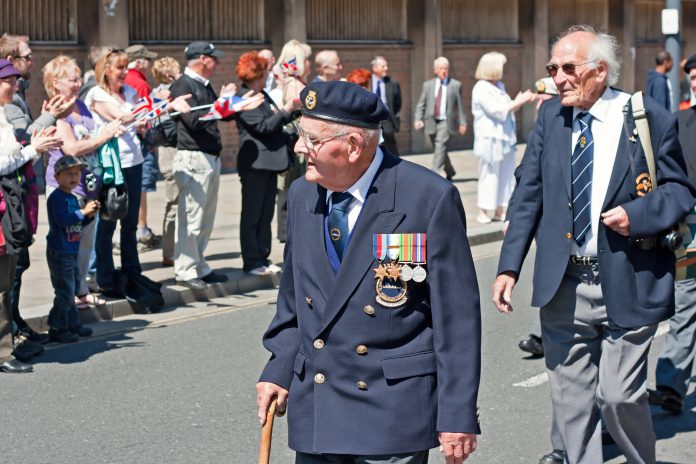Defence Secretary Penny Mordaunt has announced a new package of mental health services to boost veteran-led support
Following the Government’s allocation of £10 million to support veterans mental health, through the Armed Forces Covenant Fund Trust, the new Defence Secretary has announced that up to £9 million of this funding will be allocated to mental health and wellbeing activities.
She also announced that additional measures will be taken to attract and support applications from organisations run by veterans and that the Trust has funded tools to evaluate such projects to enable those organisations to attract greater funding in the future.
Defence Secretary Penny Mordaunt said:
“Veteran led organisations often provide the most valued and effective support, but don’t have massive “backroom” operations needed to research or make applications. We will provide support so they can access this funding, and help to demonstrate the difference their work is making to the wellbeing of those who have serviced.“
As part of the package of measures, the Defence Secretary has also announced:
- As part of the new transition policy to be launched this year, when service personnel transition into civilian life, the MOD will seek consent from individuals to be proactively contacted in the future, in order to signpost towards support if required.
- The Department for Work and Pensions and the Ministry of Defence will review specific information for veterans in receipt of benefits, pensions and compensation to ensure they are clearly pointed to where support is available. DWP will also introduce an indicator on the Universal Credit system, which will allow them to understand where veterans claiming benefits are, so they can ensure they’ve got their resources in the right place.
- The current MOD veterans study will be extended to include the most recent service leavers and will be updated on an ongoing basis to provide real-time monitoring of suicides.
- This will be complemented by a new study, funded jointly by the MOD and NHS (England), by Manchester University into ex-service personnel who take their own lives. The study will look at risk factors in the year leading up to a suicide and will use the National Confidential Inquiry into Suicide and Mental Health database and records from Coroners’ inquests to look at factors which led an individual to take their own life. Combined, these studies will provide increasingly robust data in order to understand whether suicide in the ex-forces community is disproportionate compared to the rest of the UK general population and will identify potential interventions in order to prevent suicide.
- The appointment of the first Armed Forces Mental Health and Wellbeing Champion, Warrant Office Glenn Haughton OBE, who served in Northern Ireland, Iraq and Afghanistan.
Currently serving as the Senior Enlisted Advisor to the Chiefs of Staff (SEAC), WO1 Haughton works with senior officers across the British Army, Royal Navy, Royal Marines and Royal Air Force to improve awareness of the issues facing service personnel at all levels. His new role will focus on the mental health and wider wellbeing of the Armed Forces, raising awareness for the support available and the promoting the benefits of mental fitness within the military.
Minister for Defence People and Veterans Tobias Ellwood, said:
“I’m incredibly proud of how far our Armed Forces have come when it comes to recognising the importance of mental resilience, and having the courage to come forward and ask for help when it is needed.
“But we still have a long way to go to encourage our people to get talking, share their experiences, and to make sure the support they need is never more than a phone call away.”
WO1(SEAC) Glenn Haughton, Armed Forces Mental Health and Wellbeing Champion, said:
“It doesn’t matter how big and tough you are – mental health can affect us all. My job will be to promote the tools available to enhance mental fitness and well-being, and to make sure those at the senior levels of Defence understand how best we can support. Every member of the Armed Forces deserves to know what help is available and how they can use it.”
Mental Health Awareness Week will also see the launch of Project REGAIN – the new initiative designed by Royal Marines, aimed at promoting early detection of those who could suffer from mental health issues. REGAIN allow Royal Marines and related ranks to refer themselves directly to specialists without the need to first go through their unit’s medical officer. This will ensure that getting support is as straightforward as possible. They will be required to make one phone call to an MOD mental health unit in Colchester, who will put them straight through to a nurse who will arrange an appointment locally.
The MOD is committed to supporting not just those who are serving, but also those who have left the forces and might be struggling to adapt to civilian life. Last year, the Veterans’ Gateway – the first port of call for those in need – launched a new proactive outreach trial to check our veterans are receiving the care they deserve.
The ongoing trial, supported by £108,000 of funding from the Ministry of Defence, has so far made over 6,000 outbound calls, with over 300 resulting in referrals to support services or additional guidance and advice being provided.











